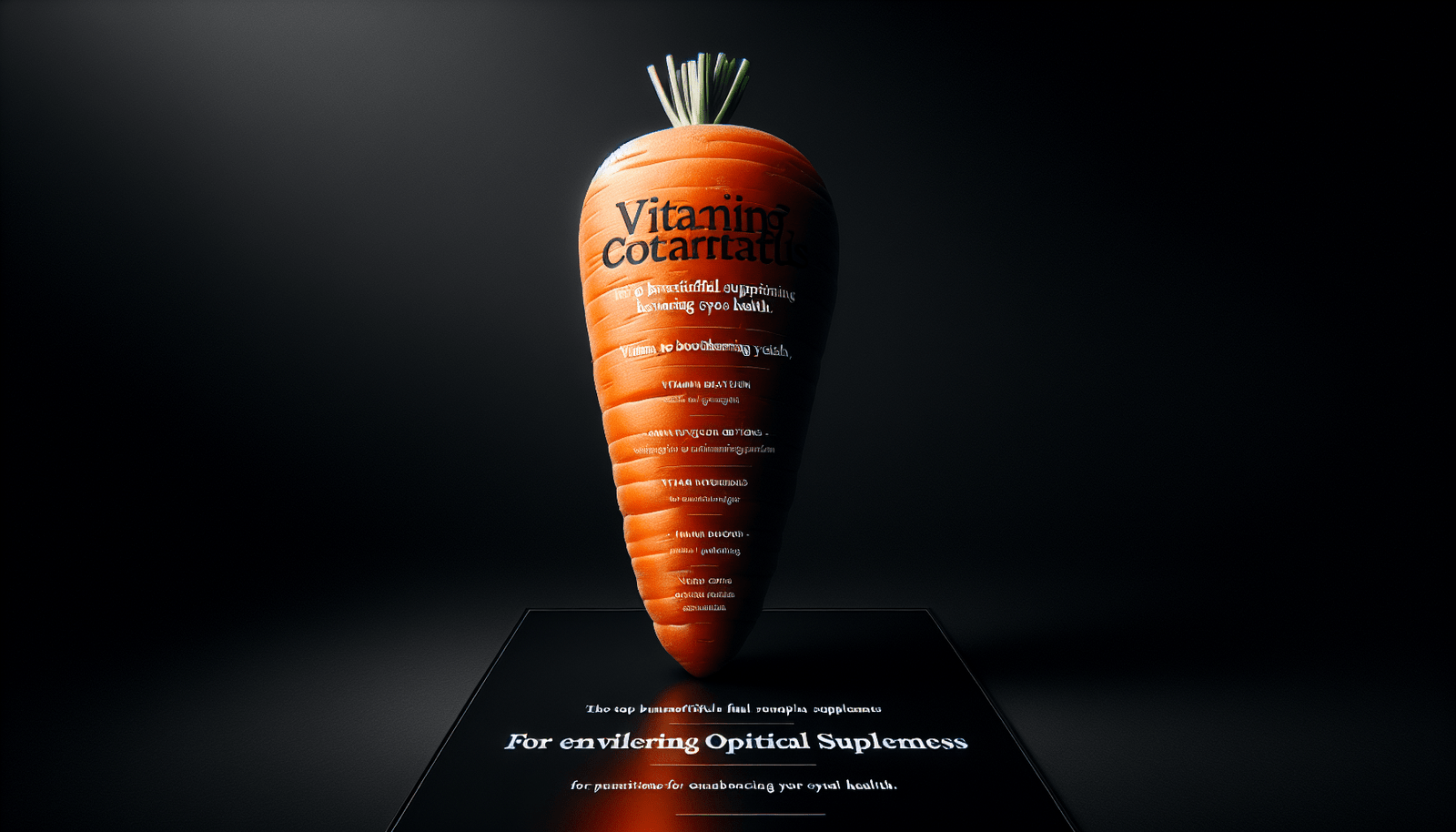Have you ever wondered if there are supplements that can actually improve your eye health and vision? Good news! There are indeed certain supplements that have been proven to support and enhance eye health. In this article, we will explore some of the top supplements that have been recommended by experts in the field. By incorporating these supplements into your daily routine, you can give your eyes the boost they need to maintain optimal vision and overall health. So let’s take a closer look at these eye-nourishing supplements and how they can benefit you.
Vitamins for Eye Health
Vitamin A
Vitamin A is an essential nutrient for maintaining good eye health. It plays a crucial role in ensuring proper functioning of the retina, which is responsible for our ability to see in low light conditions. This vitamin also helps promote healthy corneas and prevents dryness and night blindness. You can find vitamin A in foods such as sweet potatoes, carrots, spinach, and beef liver. However, if you struggle to incorporate these foods into your diet, taking a vitamin A supplement can be a convenient way to ensure you’re getting enough of this important nutrient.
Vitamin C
Vitamin C is known for its immune-boosting properties, but did you know it is also beneficial for your eyes? This powerful antioxidant helps protect the eyes against damage caused by free radicals, which can contribute to the development of age-related macular degeneration (AMD) and cataracts. Foods rich in vitamin C include citrus fruits, strawberries, bell peppers, and kiwi. Adding these fruits and vegetables to your diet can provide your eyes with the necessary dose of vitamin C to support their health.
Vitamin E
Vitamin E is another antioxidant that plays a crucial role in maintaining healthy eyes. It helps protect the cells of the eyes from damage caused by harmful free radicals. This vitamin is particularly beneficial for individuals suffering from age-related eye conditions such as cataracts and macular degeneration. Nuts, seeds, and vegetable oils are excellent food sources of vitamin E. However, if these foods are not a regular part of your diet, a vitamin E supplement can be a convenient option to ensure you’re meeting your daily requirements.
Vitamin D
Vitamin D is not just important for bone health, it also plays a role in maintaining good eye health. Studies have shown that vitamin D deficiency may increase the risk of developing certain eye conditions, including age-related macular degeneration and glaucoma. You can obtain vitamin D through sun exposure and certain foods such as fatty fish, fortified dairy products, and egg yolks. However, depending on your lifestyle and dietary habits, a vitamin D supplement might be necessary to maintain optimal levels and support your eye health.
Vitamin B-complex
The B-complex vitamins, including B1, B2, B3, B6, B9 (folate), and B12, are important for overall health, including eye health. These vitamins help support the proper functioning of the optic nerve and prevent conditions such as cataracts and AMD. Fortified cereals, whole grains, beans, and leafy greens are excellent food sources of B-complex vitamins. However, if you have a limited intake of these foods, a B-complex supplement can provide the necessary nutrients to maintain healthy eyes.
Minerals for Eye Health
Zinc
Zinc is a mineral that plays a vital role in maintaining good eye health. It helps transport vitamin A from the liver to the retina, where it is needed for the production of melanin, a pigment that protects the eyes from harmful ultraviolet (UV) light. Zinc deficiency has been linked to poor night vision and an increased risk of developing cataracts and AMD. Good food sources of zinc include oysters, beef, poultry, and fortified cereals. If you have difficulty including these foods in your diet, a zinc supplement can help ensure you’re meeting your daily needs.
Copper
Copper is another essential mineral for maintaining healthy eyes. It aids in the production of melanin, which helps protect the eyes from UV damage. Copper also supports the maintenance of collagen, a protein that is essential for the health of the cornea and other eye structures. Shellfish, whole grains, and nuts are excellent sources of copper. However, if you have limited access to these foods, a copper supplement can be a useful addition to support your eye health.
Selenium
Selenium is a trace mineral that has antioxidant properties, helping to protect the eyes from oxidative stress and inflammation. Research has shown that selenium supplementation may reduce the risk of developing cataracts and improve overall eye health. You can find selenium in foods such as Brazil nuts, tuna, and whole grains. However, if these foods are not readily available or do not suit your dietary preferences, a selenium supplement can be a convenient way to incorporate this mineral into your routine and support your eye health.

Antioxidants for Maintaining Vision
Lutein
Lutein is a powerful antioxidant that helps filter harmful blue light and protects the eyes from oxidative damage. It is particularly important for the health of the macula, the part of the retina responsible for central vision. Green leafy vegetables like spinach and kale are rich sources of lutein. If these foods are not regularly included in your diet, you can also find lutein in supplement form, which can help support and maintain your vision.
Zeaxanthin
Zeaxanthin is another antioxidant that works synergistically with lutein to protect the eyes from damage caused by free radicals. It is also essential for the health of the macula and has been shown to help reduce the risk of developing age-related macular degeneration and cataracts. Foods high in zeaxanthin include orange peppers, corn, and eggs. If you have difficulty incorporating these foods into your diet, a zeaxanthin supplement can be a valuable addition to support your eye health.
Astaxanthin
Astaxanthin is a red pigment found in certain marine organisms, such as algae and krill. It has powerful antioxidant properties that help protect the eyes from oxidative stress and inflammation. Astaxanthin has been shown to improve visual acuity, reduce eye fatigue, and support overall eye health. While it can be derived from dietary sources like salmon and shrimp, taking an astaxanthin supplement can be an effective way to ensure you’re getting an optimal dosage to support your vision.
Omega-3 Fatty Acids for Eye Health
DHA
Docosahexaenoic acid (DHA) is an omega-3 fatty acid that is essential for maintaining the health of the retina. It contributes to the structural integrity of the photoreceptor cells and helps protect the eyes against inflammation and oxidative damage. Fatty fish like salmon, mackerel, and sardines are excellent dietary sources of DHA. However, if you don’t consume fish regularly, a DHA supplement derived from algae can provide a vegetarian-friendly option to support your eye health.
EPA
Eicosapentaenoic acid (EPA) is another omega-3 fatty acid that offers benefits for eye health. Like DHA, EPA helps reduce inflammation in the eyes and supports overall eye function. EPA can be found in fatty fish like tuna and trout. If you have difficulty incorporating these fish into your diet, an EPA supplement can be an effective way to ensure you’re getting an adequate amount of this essential nutrient to support your vision.

Herbal Supplements for Eye Health
Bilberry
Bilberry is a berry native to Europe that has long been used for its potential eye health benefits. It contains compounds called anthocyanins, which have antioxidant properties and help support healthy blood vessels in the eyes. Research suggests that bilberry may improve night vision, reduce eye strain, and protect against age-related eye conditions. Bilberry can be consumed fresh or as a supplement in the form of capsules or extracts.
Ginkgo Biloba
Ginkgo biloba is a popular herb known for its potential cognitive benefits, but it may also offer advantages for eye health. It improves blood flow to the eyes, which can help reduce the risk of developing macular degeneration and improve visual acuity. Ginkgo biloba supplements are available in various forms, such as capsules, tablets, and extracts. However, it is always important to consult with a healthcare professional before starting any new supplement regimen.
Turmeric
Turmeric is a yellow spice commonly used in Indian cuisine. It contains a compound called curcumin, which has powerful anti-inflammatory and antioxidant properties. Curcumin may help reduce inflammation in the eyes and protect against conditions such as cataracts and dry eye syndrome. Turmeric can be incorporated into your diet through cooking or taken as a supplement for its potential eye health benefits.
Amino Acids for Eye Health
L-Glutathione
L-Glutathione is a powerful antioxidant that helps protect the lens and retina from oxidative damage. It also plays a crucial role in maintaining the transparency of the lens, preventing the development of cataracts. While L-Glutathione is naturally produced by the body, its levels can decrease with age or certain health conditions. Supplementing with L-Glutathione can help ensure optimal levels of this essential amino acid to support overall eye health.
L-Taurine
L-Taurine is an amino acid that plays a crucial role in the development and function of the retina. It helps regulate the flow of ions in retinal cells and protects against damage caused by oxidative stress. L-Taurine can be found in various animal-based foods such as meat and seafood. However, if you follow a vegetarian or vegan diet or have limited intake of these foods, an L-Taurine supplement can be beneficial for maintaining healthy eyes.

Flavonoids for Eye Health
Quercetin
Quercetin is a flavonoid that has potent antioxidant and anti-inflammatory effects. It helps protect the eyes against oxidative stress and inflammation, both of which can contribute to the development of eye conditions such as cataracts and macular degeneration. Foods rich in quercetin include apples, berries, onions, and citrus fruits. If it’s challenging to consume these foods regularly, quercetin supplements can provide a convenient way to incorporate this flavonoid into your eye health regimen.
Rutin
Rutin is another flavonoid that offers benefits for eye health. It helps strengthen the blood vessels in the eyes, reducing the risk of developing conditions like diabetic retinopathy and macular degeneration. Rutin can be found in foods such as citrus fruits, buckwheat, and asparagus. If these foods are not readily available or do not suit your dietary preferences, a rutin supplement can be a convenient way to support your eye health.
Carotenoids for Vision Improvement
Beta-carotene
Beta-carotene is a carotenoid that is converted into vitamin A in the body. This conversion process is critical for maintaining good vision, particularly in low light conditions. Beta-carotene also has antioxidant properties, helping to protect the eyes from damage caused by free radicals. Foods rich in beta-carotene include carrots, sweet potatoes, and dark leafy greens. However, if these foods are not a regular part of your diet, a beta-carotene supplement can be a convenient way to support your eye health.
Lycopene
Lycopene is a carotenoid pigment that is responsible for the red color in tomatoes and various other fruits and vegetables. While lycopene is often associated with heart health, it may also benefit the eyes. Studies have suggested that lycopene can help reduce the risk of developing cataracts and protect against oxidative damage to the eyes. Incorporating lycopene-rich foods like tomatoes, watermelon, and pink grapefruit into your diet can help support your vision.
Probiotics and Eye Health
Lactobacillus
Lactobacillus is a type of beneficial bacteria that can support overall eye health. It helps maintain a healthy balance of microorganisms in the gut, which in turn influences the health of the eyes. Research has suggested a potential link between imbalances in gut bacteria and certain eye conditions. Consuming probiotic-rich foods such as yogurt and sauerkraut or taking a lactobacillus supplement can help promote a healthy gut microbiome and support your eye health.
Bifidobacterium
Bifidobacterium is another type of probiotic bacteria that can benefit eye health. Like lactobacillus, it helps maintain a healthy balance of gut bacteria, which may have a positive impact on the eyes. Bifidobacterium can be found in fermented foods like kefir, miso, and tempeh, as well as in supplement form. Incorporating these probiotic-rich foods or taking a bifidobacterium supplement can contribute to the overall health of your eyes.
Combination Supplements for Eye Health
Eye Health Multivitamins
Eye health multivitamins are comprehensive supplements specifically formulated to support the various nutritional needs of the eyes. These supplements typically contain a combination of vitamins, minerals, antioxidants, and other eye-supporting nutrients. They can be a convenient option for individuals looking to support their eye health without having to take multiple individual supplements. However, it is essential to carefully read the labels and consult with a healthcare professional to ensure the supplement meets your specific needs.
Vision Support Formulas
Vision support formulas are supplements designed to target specific eye conditions or concerns. These formulas often combine various nutrients, antioxidants, and herbal extracts that have been shown to support eye health. Vision support formulas can be beneficial for individuals looking to address specific issues such as dry eyes, macular degeneration, or cataracts. As with any supplement, it is important to follow the recommended dosage and consult with a healthcare professional if you have any underlying health conditions or are taking medication.
Eye Health Supplements for Aging Eyes
As we age, our eyes undergo various changes that can affect vision and overall eye health. Eye health supplements specifically designed for aging eyes take into account these age-related changes and provide nutrients targeted to support the unique needs of older individuals. These supplements often contain a combination of vitamins, minerals, antioxidants, and specialized ingredients such as lutein and zeaxanthin. If you are experiencing age-related vision changes, considering an eye health supplement designed for aging eyes can be a proactive approach to maintaining your eye health.
In conclusion, the health of your eyes is crucial for maintaining optimal vision and overall well-being. While incorporating a balanced diet rich in eye-supportive nutrients is essential, supplements can provide an additional boost to support your eye health. From vitamins and minerals to antioxidants, omega-3 fatty acids, herbal supplements, amino acids, flavonoids, carotenoids, probiotics, and combination formulas, there are numerous options available to help promote and maintain your eye health. As always, it is important to consult with a healthcare professional or ophthalmologist before starting any new supplement regimen to ensure it is appropriate for your individual needs. With proper care and attention, you can take proactive steps towards maintaining clear and healthy vision for years to come.
